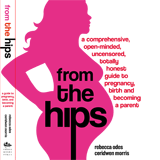take this job and leave it
We're all for the AAP's new gung-ho stance on breastfeeding. But now it's time for the rest of the country to put their money where the kid's mouth is. If breastfeeding is so crucial to the baby's well being, let's make it a little more possible for women to breastfeed. How do we reconcile the AAP's call for 6 months of exclusive breast milk with maternity leaves that max out at 3 months? Considering the high percentage of women who work and the low percentage of women who are able to find a private, clean, convenient place to pump (every two to three hours, as recommended) in their workplace, we say:
If this country is serious about upping breastfeeding rates, we need to back up the pressure with some policy.
Ted Greiner, PhD (breast feeding scholar, advocate, researcher….), delivered this paper at a UNICEF workshop in 1990, but we haven't made nearly enough progress in maternity leave policy since then.
In striving to find the optimal maternity leave policy the following aspects should be considered:
1) Maximum flexibility, or choice should be allowed to the woman so that the only leave taken before delivery is that which is really needed. (Most health professionals support women's common preference to work up to nearly the date of delivery, except in certain states of ill health.) This allows the bulk of leaves to be taken after delivery.
2) At least four but preferably six months leave should be provided at nearly full pay, to enable women to practice exclusive breastfeeding during this period. Employers should not be asked to pay for this, or if they do, should be given tax credits for it.
3) A small sum of money could be provided to women who wanted to take a longer leave than this, at least for a few months, with no risk of losing their job or their seniority.
4) Flexible and/or shorter working hours for another period of time, should be provided for those women who want it, especially if the total length of the maternity leave is less than four months.
5) Paternity leaves should be encouraged for men to be present at the time of delivery and to assist at home during the time of mother's recovery. In several countries parental leave is offered after the maternity leave and the father is ncouraged to spend time at home later in his infant's life. Besides the obvious benefit for mother, father and child, parental leaves would help reduce the bias against hiring women.
See the whole paper here:
in breastfeeding













